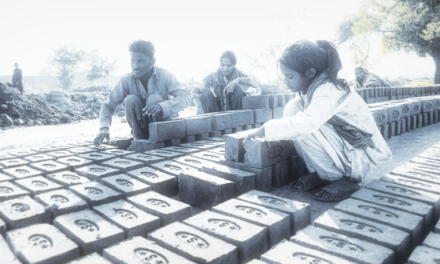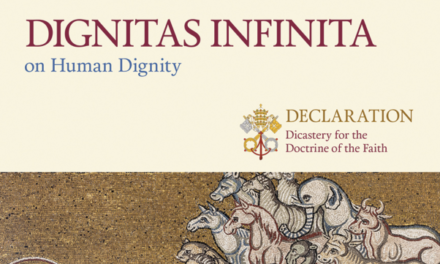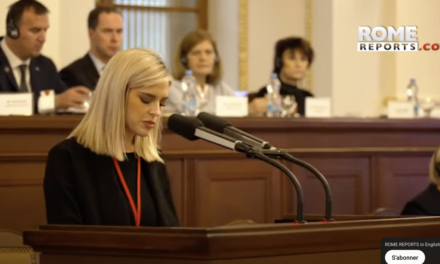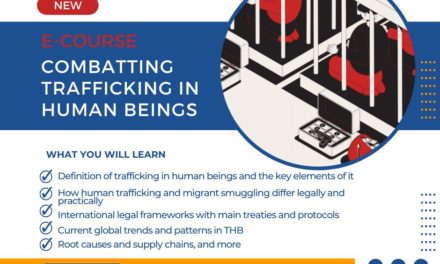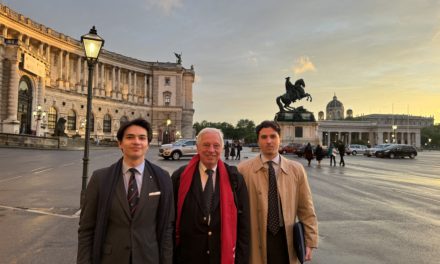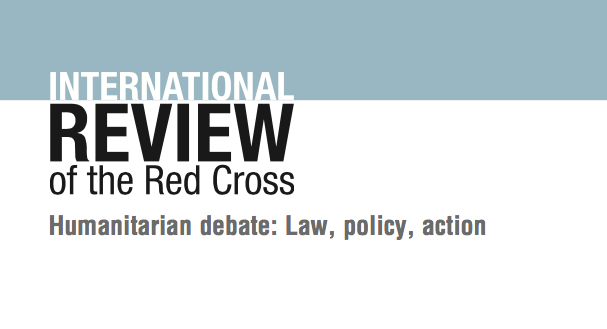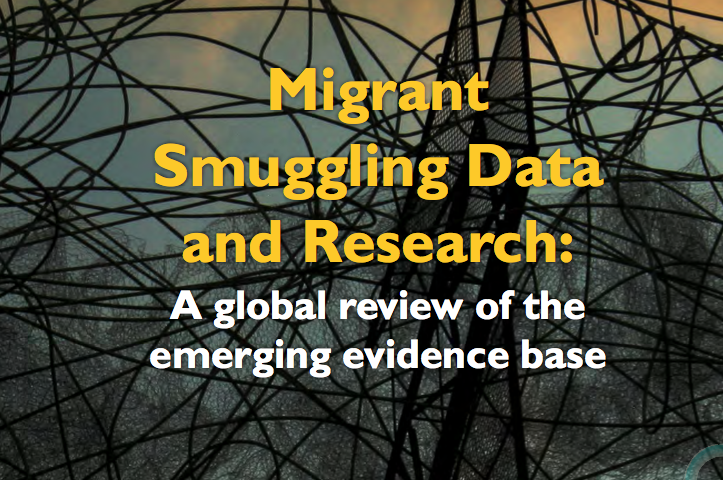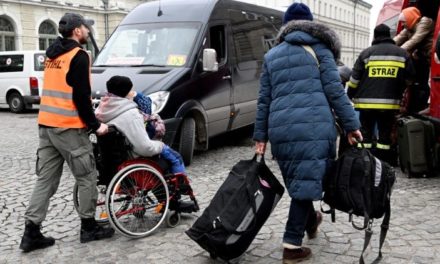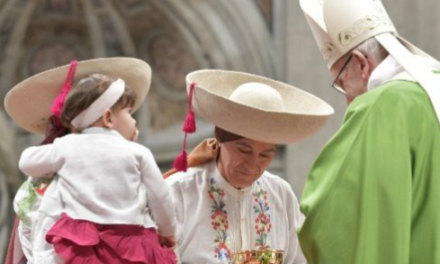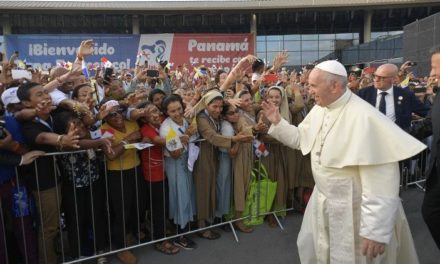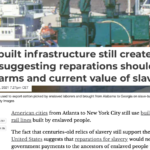
Pope Pius XII — 1952 / Exsul Familia Nazarethana — Apostolic Constitutionm / The Church’s Motherly Solicitude for Migrants
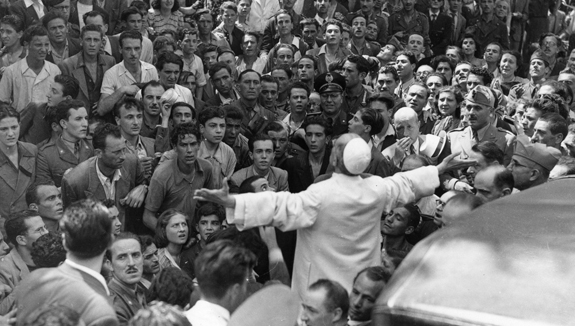
http://www.papalencyclicals.net/pius12/p12exsul.htm
Exsul Familia Nazarethana
Apostolic Constitution
INTRODUCTION
The émigré Holy Family of Nazareth, fleeing into Egypt, is the archetype of every refugee family. Jesus, Mary and Joseph, living in exile in Egypt to escape the fury of an evil king, are, for all times and all places, the models and protectors of every migrant, alien and refugee of whatever kind who, whether compelled by fear of persecution or by want, is forced to leave his native land, his beloved parents and relatives, his close friends, and to seek a foreign soil.
For the almighty and most merciful God decreed that His only Son, “being made like unto men and appearing in the form of a man,” should, together with His Immaculate Virgin Mother and His holy guardian Joseph, be in this type too of hardship and grief, the firstborn among many brethren, and precede them in it.
In order that this example and these consoling thoughts would not grow dim but rather offer refugees and migrants a comfort in their trials, and foster Christian hope, the Church had to look after them with special care and unremitting aid. She sought to preserve intact in them the Faith of their fathers and a way of life that conformed to the moral law. She also had to contend strenuously with numerous difficulties, previously unknown and unforseeable, which were encountered abroad. Above all, it was necessary to combat the evil work of those perverse men who, alas, associated with migrants under the pretext of bringing material aid, but with the intent of damaging their souls.
How serious and grave would be the reasons for anxiety and anguish had the Church’s spiritual care been lacking or found wanting in the past or the present! The disasters would have been more lamentable than those of the tragic days of St Augustine! Then, the Bishop of Hippo insistently urged his priests not to leave their flocks without pastors during the oppressive catastrophes. He reminded them what benefits their presence would bring and what havoc would inevitably follow if their flocks were abandoned.
When the priests are absent, what ruin for those who must leave this world either unbaptized or still chained by sin! What sadness for their friends, who will not have them as companions in the repose of eternal life! What grief for all, and whet blasphemy by some, due to the absence of the priest and of his ministry.
One can readily understand what the dread of passing evils can do, and what great eternal evil follows! On the other hand, when the priests are at their posts they help everyone with all the strength the Lord has given them. Some are baptized, others make their peace with God. None is deprived of receiving the Body of Christ in Communion; all are consoled, edified and urged to pray to God, Who can wand off all dangers!
TITLE I
The Church’s Motherly Solicitude for Migrants
Holy Mother Church, impelled by her ardent love of souls has striven to fulfill the duties inherent in her mandate of salvation for all mankind, a mandate entrusted to her by Christ. She has been especially careful to provide all possible spiritual care for pilgrims, aliens, exiles and migrants of every kind. This work has been carried out chiefly by priests who, in administering the Sacraments and preaching the Word of God, have labored zealously to strengthen the Faith of the Christians in the bond of charity.
Let us briefly review what the Church has done in this matter in the distant past and then discuss more fully the implementation of this work in our own times.
First, let us recall what the great St. Ambrose did and said when that illustrious Bishop of Milan succeeded in ransoming the wretched captives who had been taken after the defeat of the Emperor Valentine near Adrianopolis. He sacrificed the sacred vessels in order to protect the destitute ones from physical suffering and to relieve them of their pressing spiritual dangers which were even a greater hazard. “For who,” said Ambrose,
is so callous, unfeeling, herd-hearted and cruel that he does not want men saved from death and women from barbarous attacks worse than death?
For who is not willing to rescue girls and boys or little children from the service of pagan idols, into which they have been forced under pain of death? We have not undertaken this work without reason; and we have done it openly to proclaim that it is far better to preserve souls for the Lord than to preserve gold.
Equally noble were the vigorous ardent labors of bishops and priests who sought to bring to newcomers the blessings of the true Faith and to introduce them into the social customs of these new countries. They also facilitated the assimilation of the uncultured invaders whom they introduced both to the Christian religion and to a new culture.
We indeed are happy to recall those religious orders founded specifically to ransom prisoners. Their members, burning with Christian love, endured great hardships on behalf of their enchained brothers for the purpose of liberating, or at least, of consoling many of them.
With the discovery of the New World, Christ’s priests were the tireless companions of the men who founded colonies in those far distant lands. It was these priests who made sure that these colonists would not desert Christian ways nor become proud because of the riches acquired in the new lands. These priests also wished to move forward suitably and readily as missionaries to teach the Gospel to the natives, who previously were entirely ignorant of the Divine Light. And they zealously proclaimed that the natives were to be treated as brothers by the colonists.
We must also mention those apostles of the Church who labored for the relief and conversion of those Negroes who were barbarously deported from their own land and sold as slaves in American and European ports.
We wish also to say a few words concerning the unceasing care exercised in behalf of pilgrims by a number of devout associations. Providentially set up during the Middle Ages, these groups flourished throughout the Christian world, and especially here in Rome. Under their influence, innumerable hospices and hospitals for strangers, churches and national societies were established. Many traces of them are found even today.
Especially worthy of note were the Pilgrims’ Halls: Saxon, Frankish, Frisian, which by the 8th century had been established around the Vatican beside the tomb of St. Peter, Prince of the Apostles. These Halls housed visitors from countries north of the Alps who had journeyed to Rome to venerate the memory of the Apostles.
These Halls were provided with their own churches and cemeteries, and staffed by priests and clerics of their respective nationalities, who provided for the material and spiritual welfare of their people, especially the sick and the poor. In the following centuries other monasteries were built, with their associated hospices for pilgrims. Included among them were Ethiopian or Abyssinian, Hungarian and Armenian Halls. All this happily echoed words of the Apostle Paul: “… sharing the needs of the saints, practising hospitality.”
This experience proves that the sacred ministry can be carried on more effectively among strangers and pilgrims if it is exercised by priests of their own nationality or at least who speak their language. This is especially true in the case of the uneducated or those who are poorly instructed in the Catechism. The Fourth Lateran Council solemnly affirmed that this rightly was so, declaring in 1215: “We find in most countries, cities and dioceses in which people of diverse languages who, though bound by one Faith, have varied rites and customs. Therefore we strictly enjoin that the Bishops of these cities or dioceses provide the proper men, who will celebrate the Liturgical Functions according to their rites and languages. They will administer the Sacraments of the Church and instruct their people both by word and by deed.” The Church has followed this instruction scrupulously, even down to our own days.
Indeed, as we know, special parishes have been established for the various languages and nationality groups. At times, even dioceses have been established for the different rites. It is this aspect to which we now turn our attention.
Such parishes, most frequently requested by the emigrants themselves, were a source of great benefit both to dioceses and to souls. Everyone recognizes this and respects it with due esteem. Therefore, the Code of Canon Law duly provides for them (Can. 216, 4). And as the Holy See gradually gave its approval, numerous national parishes were established, especially in America. Very recently, to cite but one example, parishes were set up, by decree of the Consistorial Congregation, for the Chinese living in the Philippine Islands.
Indeed, there never has been a period during which the Church has not been active in behalf of migrants, exiles and refugees. But to be brief, we will recount only her work of recent years.
It is well to begin this survey by mentioning the fifty volumes preserved in the Vatican Archives: Holy See’s Care in behalf of the French. Truly they constitute a magnificent proof of the never-ending devotion of the Roman Pontiffs to the hapless persons banished from their country by revolution or war.
These volumes reveal the fatherly care taken of the French by our predecessors Pius VI and Pius VII. Driven from their native land, many of these émigrés were received with open arms in the Papal State, and particularly in Rome, while others took refuge in other countries.
We are happy to mention Blessed Vincent Pallotti, the eminent founder of the Catholic Apostolic Society. We ourselves have called him the “pride and glory of the Roman Clergy” and at the beginning of the recent Jubilee year, we gladly announced that he was among the resplendent company of the Beatified. Urged on by love of souls and eager to strengthen the Catholic Faith of Italian immigrants in England, Blessed Vincent sent several of his Congregation to London to provide for the spiritual care of their people. Our predecessor Pius IX granted Blessed Vincent’s request for permission to collect funds for the construction of a new church building in Landon which was to be dedicated to the glory of God in honor of St. Peter, Prince of the Apostles, and it was intended chiefly for Italian immigrants.
Toward the end of the 19th century, when the social means of prosperity became available to the poor in a manner previously unknown, great waves of people left Europe and moved especially from Italy to America. As usual the Catholic Church devoted special effort and care to the spiritual welfare of these emigrants. Inspired by devotion towards her exiled sons, she has through the centuries been ever quick not only to approve new methods of Apostolate, more suitable to the progress of peoples and the changed circumstances of the times, but she has also zealously integrated them into this new social system, for she is ever careful to warn of the dangers that threaten society, morality, and religion.
The record of our predecessor Leo XIII provides clear evidence of the Holy See’s diligent solicitude, a solicitude which became more ardent as public officials and private institutions seemed the more dilatory in meeting the new needs. Leo XIII not only upheld vigorously the dignity and rights of the working man but also defended strenuously those emigrants who sought to earn their living abroad. On July 9, 1878, when he had been Pope for only a year, he graciously approved the Society of St. Raphael, established by the Bishops of Germany to aid emigrants from that nations Through the years, the Society worked advantageously in behalf of emigrants in the ports of departure and arrival, and aided other nationalities, such as Belgian, Austrian and Italian, as their own.
Later, in an Apostolic Letter of 1887, he approved as most beneficial and timely the project of the Servant of God, John Baptist Scalabrini, then Bishop of Piacenza. The plan was “to found an institute of priests ready and willing to leave their native land for remote places, particularly, for America, where they could carry on the priestly ministry among the numerous Italian Catholics, who were forced by economic distress to emigrate and to take up residence in foreign lands.”
Then, aided by energetic priests and far-sighted prelates, this apostolic man, whom we ourselves in 1946 proclaimed most valuable to the Church and State, founded a Society of priests. In the apt words of Leo XIII, in the letter which we shall mention later, Leo said: “In that Society, priests burning with love of Christ gather together from all parts of Italy to devote themselves to studies and to practices of these duties and ways of life that would make them effective and successful ambassadors of Christ to the Italians scattered abroad.”
Thus was founded a new religious community, the Missionaries of St. Charles for Italian Emigrants. The Servant of God John Baptist Scalabrini is honored as its Founder.
We are happy likewise to mention another letter that the same great Leo, our predecessor, sent the following year to the Archbishops and Bishops of America. Fortunately that letter inspired many new projects and developed an eager rivalry in giving aid to the emigrants. Numerous priests, as well as many members of religious communities journeyed to every part of America in order to help their scattered brethren. At that same time, societies and institutions were established to aid the masses of emigrants from Italy, Germany, Ireland, Austria, Hungary, France, Switzer-land, Belgium, Holland, Spain and Portugal, and very prominent national parishes were established.
In his wisdom and charity, Leo XIII did not neglect mere temporary migrations or those migrations within Europe. More than one letter from the Secretary of State to the Italian Bishops testifies clearly to this concern of the great Pontiff.”
Again inspired by the earnest call of Leo XIII and impelled by the love of souls, Jeremias Bonomelli, Bishop of of Cremona, founded an Agency for the Assistance of Italians who had migrated to other parts of Europe. From this Agency arose many institutions and flourishing centers of civic education and welfare. In 1900, devout priests and eminent laymen attracted to the work founded successful “missions” in Switzerland, Austria, Germany and France. So that such a beneficial work might not cease, with the death of Bonomelli our predecessor Benedict XV entrusted Ferdinand Rodolfi, Bishop of Vicenza, with the care of Italians who had emigrated to various countries of Europe.”
It is well also mention here, those numerous institutions for the education of boys and girls, the hospitals and other welfare agencies most beneficially established for the faithful of various language groups and national origins. These institutions daily became more and more prosperous. It is in this type of work that St Frances Xavier Cabrini stands out most brilliantly. Advised and encouraged by that Servant of God, John Baptist Scalabrini, this saintly woman was also supported by the authority of Leo XIII of happy memory. The Holy Father persuaded her to look westward rather than towards the East. Having decided to go to North America, she persevered in her missionary under-takings with such love that she herself reaped the richest harvests. Moreover, because of her extraordinary devotion and outstanding work for Italian emigrants, she was rightly called the “Mother of Italian Emigrants.”
It is to our predecessor St. Pius X that we must attribute the systematic organization of Catholic labors in behalf of emigrants in Europe, in the East and in America. While he was still a pastor in Salzano, he went to the assistance of those of his beloved people who were emigrating, seeking to assure them a safe voyage and a secure living in the new country. Later, as Pope he looked with a special care after the uprooted and dispersed sheep of his universal flock and made special provision in their behalf.
St. Pius X was aflame with love for the faithful who had emigrated to distant lands, such as North and South America. The zeal of the Bishops and priests in welcoming them was a great joy to him, as is clearly evident from a letter he sent the Archbishop of New York, on February 26, 1904. In this letter he praised and approved the concern the Archbishop had shown for Italian immigrants to guard them from many dangers and help them to persevere in the practice of the Faith of their Fathers. He also praised the Archbishop’s efforts in founding a seminary for the proper training of priests from the Italian community.
St. Pius’ interest is also attested by remarks he made in an address to pilgrims from the Argentine Republic18 and in a letter to the Bishops of Brazil.19 And similarly in letters to the Superior General of the Missionaries of St. Charles 20 and to the Director of the Antonian Society. Likewise to the President of the Catholic Society for Immigrants, which had been recently founded in Canada.
As a matter of fact the Missionary Society of St. Anthony of Padua was established in 1905 with the approval of St. Pius X specifically to provide proper spiritual care for the emigrants both during the voyage and in the ports of disembarkation and after their settlement in their adopted countries.
As to Italy itself, most important were the regulations issued by the Secretary of State of the Bishops of that land.
Both the Bishops of the emigrants and those of the émigrés constantly kept the Consistorial Congregation informed of their conditions. The same Consistorial Congregation carried out promptly the Pontiff’s order by properly reorganizing existing agencies for migrants and by setting up new agencies where necessary, as well as recommending to Bishops the establishment of committees and sponsorships on behalf of emigrants.
In his great solicitude, St. Pius X did not confine himself to one method of spiritual aid. Because of the hardships and the circumstances of the places in which they found them-selves, some people, after emigrating from Europe to distant lands, were contracting marriage without the canonical formalities and even resorted to attempted marriage. Since such formalities were designed to prevent certain highly undesirable evils, the Pontiff was anxious that they be fully observed. When he learned of their neglect, he directed the Congregation of Sacraments to issue instructions concerning proof of freedom to marry and, likewise, the notification of the contracted marriage. These instructions were issued again,” by the same Congregation a few years later and afterwards even these were supplemented by prudent rules for the benefit of migrants contracting marriage by proxy.
While the great St. Pius X was governing the Universal Church, special rules were promulgated for the priests and laypeople of the Ruthenian Rite living in the United States, even a Ruthenian Bishop was assigned to them and still another Ruthenian Bishop was entrusted with the spiritual care of Catholics of the Rite who were resident in Canada.
Under the same pontificate, a society for the extension of the Catholic Church was founded in Toronto, Canada. This worthy society was abundantly successful, for it protected from the inroads of heretics the Ruthenian Catholics living in Northwest Canada. The rules governing the relations between the Canadian Hierarchy and the Ruthenian Bishop, and between the priests and laity of both rites, were clearly established.
In Rome, the Church of Our Savior and its adjoining rectory on the Via delle Copppelle were given to the Rumanian Bishop from the ecclesiastical province of Fagaras and Alba Julia.
The most important, however, of all the measures in behalf of the emigrants was the establishment, in the Consistorial Congregation, of the Special Office for the Spiritual Care of Migrants. “Its purpose,” in the words of St. Pius X, was:
To seek out and provide everything to improve the condition of the migrants of the Roman Rite in all that pertains to the welfare of souls. With regard to migrants of Raster, Rites, however, the rights of the Congregation for the Propagation of the Faith are to be preserved. This Congregation may, within its competence, make appropriate provision for them. The Special Office, however, has exclusive charge of migrants who are priests.
Neither could provision and guidance for migrant priests be neglected. Indeed the Holy See had long before cared for them through the Congregation of the Council” and through the Congregation for the Propagation of the Faith for clerics of Oriental Rites, as well as through the Consistorial Congregation. Since, in fact, some of the priests who emigrated overseas were victimized by material comforts and overlooked the welfare of souls, timely rules were published by the same Consistorial Congregation. The rules applied also to priests “discharging their mission among farmers and other workers: ” By these rules potential abuses would be rooted out and penalties fixed for violations.
In another decision of the Consistorial Congregation, those rules were made to conform with the Code of Canon Law, published a short time before, and they are still beneficially in force. As time passed, other regulations were added by the Congregation for the Oriental Church and by the. Congregation for the Propagation of the Faith, each for priests under its own jurisdiction.
The same Pontiff must also be credited with the beginning of the Roman College established for the benefit of Italians who had emigrated to other lands. Young priests from the secular clergy were to be given a special course of studies and be trained for the sacred ministry among emigrants. In order that the number of students might correspond to the need, he urged the Italian Bishops, and particularly those who had an ample supply of priests, “to send to the college any of their priests who seemed qualified.”
Finally in the last days of his pontificate, when this saintly Pontiff was heartbroken at the prospect of a catastrophic war and was about to receive his eternal reward, it was he who personally, as a most loving father, drew up the by-laws of the College subsequently turning them over to the Consistorial Congregation for publication.
Earnestly following the distinguished path of his predecessor, and accepting the care of migrants as an inheritance bequeathed to him, the Pontiff Benedict XV had scarcely ascended the Chair of St. Peter when he secured the residence for the above mentioned College at St. Apollinaris. The Holy See, at this time, was providing a great deal of financial war relief for the areas ravaged by war easing inflicted un the victims. Hence the Vatican could no longer support the College single-handedly. It was then that the Consistorial Congregation did not hesitate to ask the Bishops of Italy and America for funds to maintain it.
In order to assist Catholic endeavors in behalf of the spiritual care of Italian migrants, this same Congregation requested the Bishops of Italy to establish an annual day for taking up a collection for this work. Later, it directed that every pastor should each year offer one Mass for the intention of the Holy Father, instead of pro populo, and should contribute the offering from such Mass to the apostolate in behalf of emigrants.
Full well do all know, especially migrants and missionaries, that this money was exclusively spent to support relief agencies which were established in foreign lands to provide timely and secure aid to migrants, “whose Catholic Faith and Catholic practices were often threatened with almost incredible dangers.” In fact, these agencies are either under the direction of the Consistorial Congregation or of missionaries of religious communities of men or women.
The same Pontiff proposed to the Bishops of Calabria that ecclesiastical sponsorships be established for the benefit of Italian migrants.
Foreign workers were then pouring into Brazil from Europe; some in the hope of becoming prosperous, others driven by want. Benedict XV, therefore, earnestly requested the Archbishop of Sao Paulo and the other Bishops of Brazil to undertake their care, with the cooperation of their good Brazilian priests,” so that the new workers would not, once they had left their native countries, give up the Christian customs of their ancestors.
Benedict XV also recommended the same practices to the Bishop of Trenton, while praising his great diligence in this work. For, when an Italian community developed in that diocese, a church and an adjacent building were immediately erected for them. In fact, the Pontiff expressed his ardent wish that Italian immigrants would be the object of the same solicitude and assistance everywhere in the United States.
At this same time, Benedict XV also interested himself in those Italians who were leaving their homes and migrating temporarily into other parts of Italy, as the women who work iii the rice fields do even today.”
Later, he very wisely decided to appoint a prelate, who, empowered with the necessary faculties and free from diocesan duties, could devote himself entirely to the spiritual welfare of Italian migrants. It was, therefore, in 1920 that Benedict XV established the office of prelate for the Italian migrants with the exclusive duty of choosing missionaries destined for such work. The function of the office was also to assist and supervise them and to direct the College for priests who were to be assigned to provide religious and moral guidance to Italian emigrants abroad. So as to speed the development of this College, he set up the following year new by-laws to govern it in a manner more adapted to the needs of the times and circumstances.
Deeply moved by the tragic distress of numberless men taken prisoners in the prolonged disastrous war, Benedict XV directed that the bishop of the dioceses in which prisoners were held should without delay appoint one or, if necessary, several priests, sufficiently familiar with the language of the prisoners, to provide for their care. “The priests chosen for this work should do everything possible for the welfare of the prisoners, whether it be for their souls, or for their physical health. They should console them, help and assist them in their manifold needs, which at times prove so pressing.”
As the war continued, he appointed a special Ordinary to care for the spiritual needs of refugees who had entered Italy,’” And he did not ignore the very grave dangers of corruption to which German citizens, including many Catholics, were then exposed, compelled as they were in the misfortunes of war, to seek other lands to obtain the essentials of life. The Consistorial Congregation therefore urged the Bishops, not only of Germany but also Central Europe, to consider the problem of migrants carefully; to discuss it in their meetings and episcopal conferences and then to provide necessary means for the immediate and proper alleviation of such great need.
At the same time, he pointed out the advantage of expanding the activities of the Society of St. Raphael. It had, before the war, offered innumerable benefits to all travelers providing every kind of aid suggested by prudence and charity.
Later in 1921, the Archbishop of Cologne was appointed patron of the St. Raphael Society, founded in 1904, so that this Society might provide for the religious care of German ‑speaking Catholics then living in Italy. And this same Society in the following years also undertook the spiritual care of Germans throughout Western Europe. With the appointment of the Bishop of Osnabruck as its second patron, it cared for Germans in Eastern Europe and even outside Europe.
When civil war flared up in Mexico, a number of Mexican Bishops, priests, religious and many laymen were unjustly expelled from their native country and sought refuge in the United States. Benedict XV warmly commended them to the charity of American Catholics, writing first to the Bishop of San Antonio and then to the Archbishop of Baltimore, through whose generosity poor boys destined for the priesthood were received into the seminary. Such interest was, as the Pontiff said, “a great satisfaction to us.”
We recall also what the same Pontiff very wisely did in behalf of the faithful of the Oriental Rites. The spiritual assistance provided to the Catholics of the Greek-Ruthenian Rite, who had emigrated to South America, was widely extended. A Seminary for the Italo-Greek boys was founded at the Monastery of Grottaferrata near Rome.” The diocese of Lungro in Italy was established for Catholics of the Greek Rite who had once lived in Epirus and Albania, but had fled the Turkish Rule and reached Italy, settling in Calabria and Sicily.
Nor do we consider it out of place to mention the decree of the Congregation of Rites, designating Our Lady of Loreto the heavenly patroness of those who travel by air. May they who confide in her protection arrive safely at their destination.”
We ourselves desired that the faithful should have an opportunity of going to Confession while travelling by air. We, therefore, later decreed that the permission granted to priests by Canon 883 of the Code of Canon Law, giving faculties for hearing confessions while travelling by sea, should apply also and be extended to priests travelling by air.
Our beloved predecessor, Pius XI, allowed no obstacle to hinder this very important and successful development in behalf of migrants. Innumerable migrants and refugees in America and Europe experienced abundant proof of the universal fatherhood of Pius XI. Of the many provisions which he made, we wish merely to recall some of the more important ones beginning with those on behalf of Oriental peoples.
In the first year of his pontificate, Armenia was devastated and many loyal faithful were either slain or otherwise sent wandering far from their native country. He generously supported his unfortunate sons thus deprived of all their possessions. In particular he welcomed with fatherly hospitality sick and orphaned children into a section of his palace of Castel Gandolfo and carefully maintained them at his own expense.
In 1925, matters pertaining to Russians exiled from their country were entrusted to the Russian Commission,” and then, a special office was set up in the Congregation for the Oriential Church to care for the Catholics of the Slavic Rite” all over the world.
Consequently, an episcopal See was established in Harbin, China, and a priest of the Byzantine-Slavic Rite was placed in charge of it, and as the Russian Bishop of Harbin, he was spiritual ruler of all the clergy and lay people living in China.
Preceding Pontiffs had provided special churches in Rome for Armenians, Syrians, Maronites, Greeks, Ruthenians and Rumanians. Following their example, Pius XI assigned the Church of St. Anthony, the Hermit, on the Esquilme to Catholics of the Slavic Rite who were resident in or passing through Rome, so that they might worship according to the customs of their fathers.
A Russian Seminary, erected by his command, was there-fore set up in a brand new building within the premises.” Refugees from Eastern Europe of any religion or nationality were aided more than once by Pius XI by his encouragement, example and spontaneous offers of financial aid as well as by arousing in their behalf the generosity of the Bishops and peoples of Poland.
He sought to promote the spiritual welfare of the Byzantine Rite community which persecutions had earlier driven to Italy, where subsequently he separated the Byzantine parishes from the dioceses of Palermo and Monreale, forming the new Greek diocese or Eparchy of Piana. Likewise, he set up timely rules for the spiritual administration of the Greek-Ruthenian dioceses in the United States and Canada.
As a token of his special good-will toward the Poles, he raised to the rank and dignity of Minor Basilica the Church of St. Josaphat, Bishop and Martyr, in Milwaukee, a Church which cares for Polish-speaking Catholics. Then, in 1931, he appointed the Archbishop of Gniezno to be protector of all Polish emigrants.
Following the example of the Pious Society of the Missionaries of St. Charles for Italian migriants, a new religious institute was founded in the city of Godesberg in 1924 for the assistance of German Catholics emigrating to foreign lands. Pius XI rightly praised this worthy and promising undertaking and when the institute attained its desired development, he gave it the noble name: Society of the Holy Angels.
When bishops, priests, members of religious communities and lay people had to flee Spain because of the most detestable antireligious persecution raging there, he received them humanely and consoled them most affectionately.
In order that Mexicans who emigrated to foreign countries might not become the prey of the enemies of Christ nor lose the Christian ways of their fathers, he urged the Mexican Bishops to confer with their brother bishops in the United States, and he appealed for the cooperation of Catholic Action groups.
This is the place to duly note the love that this same Pontiff demonstrated for Negroes scattered throughout the world. It is clearly evident from a letter to the Superior General of the Society of the Divine Word, April 5, 1923, in which he sent his best wishes for the seminary shortly to be augurated for Nego students. He described as most beneficial their plan to receive into the Society of the Divine Word those Negroes who seemed called to the religious life.
Then, when these students had attained the priesthood, they might exercise the sacred ministry more effectively among their own peoples.
With regard to the Italians, the chaplains aboard ships, who until then belonged to the Missionary Society of St. Anthony of Padua, were in January 26, 1923 placed by Pius XI under the direct guidance of the head of the College of priests which had been established for Italian people migrating abroad and, subsequenly, he had the Consistorial Congregation provide practical rules for the training of these priests.
Similarly, all priests already engaged in the work of assisting Italian migrants were placed under a single director, chosen and appointed by the Consistorial Congregation. He commanded that the Italian immigrants should be provided with proper identification cards from the ecclesiastical authority before departure so that they could be more readily recognized in their new home lands.
He gave the direction of the Pious Society of the Missionaries of St. Charles to the Consistorial Congregation, a provision which brought many advantages to the Society. For through the efforts of our most beloved Raphael Cardinal Rossi, who was Secretary of the Consistorial Congregation and quite properly considered to be the second founder by the Missionaries of St. Charles, the Constitutions of the Society were brought into harmony with the Code of Canon Law and then approved. This society was restored to its original religious vows. Many new houses were established especially for training priests; likewise, several autonomous religious provinces and missions were erected. Consequently, the membership grew and its field of activity developed so rapidly in America, in Europe and more recently in Australia, that there appeared well founded hope for a more certain and permanent assistance to Italian migrants.
Finally, on April 17, 1922, that noble Pontiff bestowed his own benevolence on and enhanced the work of the Apostleship of the Sea with official Papal approval. Such work was first established in Glasgow, Scotland, in 1920 for the spiritual welfare of sailors. After numerous congresses and through the approval of Bishops, the Apostolate had so developed and so widely spread that we ourselves were happy, on May 30,1942, to place it under the beneficial direction of the Consistorial Congregation.
To usher this subject into our own pontificate, we need only, describe what the Church has accomplished during these last few years. As it is well known, soon after we were raised to the See of Rome there daily appeared more bold and violent symptoms of unrestrained desire for extending national boundaries, for an idolized supremacy of rage and the unbridled tendency to occupy foreign lands, and for reliance on might rather than on right with the consequent cruel and shameless deportation of entire nations and the forced migration of peoples. These new crimes were, indeed, far worse than the ancient ones.
Soon there developed a whirlwind of most sorrowful events leading to barbarous war. Our own efforts on behalf of charity and peace began immediately.
We tried everything possible, striving, urging, entreating, pleading, and appealing directly to the heads of governments to prevent the disastrous war. Even when this tragic war broke out and spread honor throughout the world, we still sought by word and deed to mitigate and restrain it; as much as we could. In these sorrowful circumstances, the Church, as a universal mother, failed neither in her duty nor in what was expected of her. She, the “Head of the universal society of love,” became, as was her custom, a comfort for the afflicted, a refuge for the persecuted, a homeland for the exiled.
No matter how enormous the difficulties that faced us and how impossible the times, we left nothing untried to bring some aid to our suffering sons, without discrimination as to their status or nationality. We also exerted great efforts for the displaced Jews who were victims of the cruelest persecutions.
We approved, initiated, and furthered many works of charity for the relief of countless untold wartime disasters and hardships from which practically no one escaped. But in all these works of charity, we were especially solicitous for prisoners of war, refugees, exiles and our other sons who, for whatever reason, had to wander far from their homelands. And along with these, our chief concerns were children and orphans. Yet this being well known to all, since the record is amply documented, there is no need to recount it further. We can however touch on a few specific items.
During the First World War, we assisted our predecessor, Benedict XV, in his extensive charity. Again the Second World War had scarcely broken out when, following his example, we established a special office under our Secretary of State to bring assistance to the poor and needy everywhere. Still another office, for inquiring about and exchanging information on prisoners was maintained through the war.
We also appointed a number of other commissions, among them the commission for the victims of war, for civilian refugees and for those detained in custody. This one was later replaced by the Pontifical Commission for Relief for all those who were in need. Equally worthy of mention are the missions arranged by our Secretariate of State and sent more than once into Germany and Austria, chiefly to provide for the welfare of refugees and displaced persons.
Then when peace was finally restored, at least in part, the necessity of providing for millions of refugees became daily more urgent. Many of them were prevented from returning to their homes; while at the same time, a large number of other people in many over-populated countries were oppressed by want and had to seek refuge in other lands. Hence, we decided to establish an Office of Migration in the very Secretariae of State itself. It was comprised of two sections: one for voluntary migration, the other for enforced deportation. We also delegated an ecclesiastic to the Migration Office established in Geneva so that he might attend international meetings and congresses held in that city.
Very recently, we approved the International Catholic Migration Commission, whose function is to unite and organize existing Catholic associations and committees, and to promote, reinforce and coordinate their projects and activities in behalf of migrants and refugees.
Nor should we forget to mention how our nuncios and delegates and other ecclesiastics specifically sent to organize committees or commissions for needy refugees and for migrants, successfully founded them in every country, indeed in almost every diocese. This of course, was brought about with the aid of the local bishop and of priests, and of the members of Catholic Action and other apostolic associations as well as other worthy laymen.
The diligence and skill of these committees and commissions worthy of our praise achieved many benefits which we ourselves witnessed and which we hope will safeguard migrants and refugees.
The war that broke out in Palestine in 1948 brought new reasons for sadness and mourning. Innumerable refugees underwent horrible suffering, being forced to abandon their possessions and to wander throughout Libya, Syria, Jordan, Egypt and the district of Gaza. United in a common disaster, both the rich and the poor, the Christians and the non-Christians, offered a sad and morurnful spectacle.
Immediately, following the custom of the Catholic Church to provide assistance for the wretched and the abandoned, we sent as much aid as possible. As was customary in Apostolic times, we specifically established the Pontifical Mission for Palestine, which still relieves the want of Arab refugees through money collected from Catholics everywhere, but particularly through the aid of the special agency established by American bishops, called the Catholic Near East Welfare Association.
We have tried earnestly to produce in the minds of all people a sympathetic approach towards exiles and refugees who are our needier brothers. In fact, we have often spoken of their wretched lives, upheld their rights, and more than once appealed in their behalf to the generosity of all men and especially of Catholics. This we have done in radio addresses, in talks and discourses given as occasion arose, and in letters to archbishops and bishops.
We wrote, for example, to our Venerable Brothers, Archbishops, Bishops and Ordinaries of places in Germany:
In the present circumstances, what seems most likely to stimulate and heighten your own charity and that of the German clergy is the necessity of assisting refugees by every resource and means of your ministry. We refer both to refugees from your land who live abroad in scattered regions and to alien refugees in Germany who, often deprived of their friends, their goods and their homes, are forced to lead a squalid and forlorn existence, usually in barracks outside the towns. May all good Germans and especially the priests and members of Catholic Action, turn their eyes and hearts toward these suffering neighbors and provide them with everything required by religion and charity.
Similarly, in our Encyclical Redemptoris Nostri on the Holy Places in Palestine, we lamented sadly:
Very many fugitives of all ages and every state of life, driven abroad by the disastrous war, cry pitifully to us. They live in exile, under guard, and exposed to disease and all manner of dangers.
We are not unaware of the great contributions of public bodies and private citizens to the relief of this stricken multitude; and we, in a continuation of those efforts of charity with which we began our Pontificate, have truly done all in our power to relieve the greatest needs of these millions.
But the condition of these exiles is indeed so critical, so unstable that it cannot lot much longer. Therefore, since it is our duty to urge all generous and well-minded souls to relieve as much as possible the wretchedness and want of these exiles, we most earnestly implore those in authority to do justice to all who have been driven far away from homes by the tempest of war and who long above all to live in quiet once more.
We have indeed made our gratitude known to our very dear brothers in the episcopate, as well as to priests and to citizens of every rank, to the public authorities as well to benevolent agencies that have aided refugees and emigrants in many different ways through their activities and advice.
Of these, we here recall with pleasure our letter of December 24, 1948, to the Chairman of the National Catholic Welfare Conference established by the bishops of the United States to promote the Catholic welfare; similarly, our personal letter of April 1951, which we sent to the Bishops of Australia, congratulating them on the 50th Anniversary of the Commonwealth.
Moreover, we have repeatedly addressed the Rulers of States, the heads of agencies, and all upright and cooperative men, urging upon them the need to consider and resolve the very serious problems of refugees and migrants, and, at the same time, to think of the heavy burdens which all peoples bear because of the war and the specific means that should be applied to alleviate the grave evils. We asked them also to consider how beneficial for humanity it would be if cooperative and joint efforts would relieve, promptly and effectively, the urgent needs of the sufferings, by harmonizing the requirements of justice with needs of charity. Relief alone can remedy, to a certain extent, many unjust social conditions. But we know that this is not sufficient. In the first place, there must be justice, which should prevail and be put into practice.
Likewise, from the first days of our Apostolic Office, we have directed our earnest attention to all our migrant sons, and we have been most anxious about their welfare, both temporal and eternal.
For this reason, on June 1, 1951 in a radio address on the fiftieth anniversary of the Encyclical Rerum Novarum, we did speak of the right of people to migrate, which right is founded in the very nature of land.
Let us recall here a section of that address:
Our planet, with all its extent of oceans and was and lakes, with mountains and plains covered with eternal snows and ice, with great deserts and traceless lands, is not, at the same time, without habitable regions and living spaces now abandoned to wild natural vegetation and well suited to be cultivated by man to satisfy his needs and civil activities: and more than once, it is inevitable that some families migrating from one spot to another should go elsewhere in search of a new home-land.
Then,—according to the teaching of “Rerum Novarum,” —the right of the family to a living space is recognized. When this happens, migration attains its natural scope as experience often shows. We mean, the more favorable distribution of men on the earth’s surface suitable to colonies of agricultural workers; that surface which God created and prepared for the use of all.
If the two parties, those who agree to leave their native land and those who agree to admit the newcomers, remain anxious to eliminate as far as possible all obstacles to the birth and growth of real confidence between the country of emigration and that of immigration, all those affected by such transference of people and places will profit by the transaction.
The families will receive a plot of ground which will be native for them in the true sense of the ward; the thickly inhabited countries will he relieved and their people will acquire new friends in foreign countries; and the States which receive the emigrants will acquire industrious citizens. In this receive the migrants will acquire industrious citizens. In this way, the nations which give and those which receive will both contribute to the increased welfare of man and the progress of human culture.
We again recalled these general principles of natural law the following year on Christmas Eve before the Sacred College of Cardinals.
We wrote specifically on this subject in a letter of December 24, 1948 to the American Bishops:
You know indeed how preoccupied we have been and with what anxiety we have followed those who have been forced by revolutions in their own countries, or by unemployment or hunger to leave their homes and live in foreign lands.
The natural law itself, no less than devotion to humanity, urges that ways of migration be opened to these people. For the Creator of the universe made all good things primarily for the good of all. Since land everywhere offers the possibility of supporting a large number of people, the sovereignty of the State, although it must be respected, cannot be exaggerated to the point that access to this land is, for inadequate or unjustified reasons, denied to needy and decent people from other nations, provided of course, that the public wealth, considered very carefully, does not forbid this.
Informed of our intentions, you recently strove for legislation to allow many refugees to enter your land. Through your persistence, a provident law was enacted, a law that we hope will be followed by others of broader scope. In addition, you have, with the aid of chosen men, cared for the emigrants as they left their homes and as they arrived in your land, thus admirably putting into practice the precept of priestly charity: “The priest is to injure no one; he will desire rather to aid all.” (St. Ambrose, “De Officiis ministrorum,” lib. 3, c. IX).
But no one who has heard our words, whether in our Christmas Address of 1945,116 or in our allocution of February 20, 1946 to the newly created cardinals, and in our address on the 25th of February to the Diplomatic Corps accredited to the Holy See, certainly, no one can be unaware of the grave concern gripping the heart of the worried father of all the faithful.
In these addresses and in our radio talks, we have condemned severely the ideas of the totalitarian and the imperialistic state, as well as that of exaggerated nationalism. On one hand, in fact they arbitrarily restrict the natural rights of people to migrate or to colonize while on the other hand, they compel entire populations to migrate into other lands, deporting inhabitants against their wills, disgracefully tearing individuals from their families, their homes and their countries.
In that address to the Diplomatic Corps, in the presence of a solemn gathering, we again affirmed our desire, often previously expressed, for a just and lasting peace. We pointed out another way of attaining this peace, a way that promotes friendly relations between nations; that is, to allow exiles and refugess to return finally to their homes and to allow those in need, whose own lands lack the necessities of life, to emigrate to other countries.
In our allocution to the cardinals on the feast of our patron, St. Eugene, on July 1, 1946, we again called upon the nations with more extensive territory and less numerous populations to open their borders to people from over-crowded countries. Of the latter, as is well known, Japan today happens to be the most overpopulated one.
We expressed the same view in our Christmas Address of 1948. It is better, we said, to facilitate the migration of families into those countries able to provide them with the essentials of life, than to send foodstuffs at great expense to refugee camps.
Therefore, when Senators from the United States, who were members of a Committee on Immigration, visited Rome a few years ago, we again urged them to try to administer as liberally as possible the overly restrictive provisions of their immigration laws.
Nor did we neglect to state and urge this same principle in an audience to which we were pleased to admit also eminent American Congressmen in charge of European refugee affairs l and who were likewise members of a Committee on Public Expenditures. We reaffirmed that stand very recently, on June 4th of this year, in our paternal address to our dear people of Brazil.
In an address of July 2, 1951, to the members of an International Catholic Congress for the Improvement of Rural Living Conditions, held in Rome, we said that there would be very great benefits from international regulations in favor of emigration and immigration.
Later, we described the gravity of this matter to many distinguished members of an International Catholic Migration Congress, held in Naples, whom we gladly received in audience.
We therefore offer endless thanks to God, the Bountiful Giver of every good gift, Who has most generously assisted His Holy Church. In fact it has been because of His aid and with the effective co-operation and initiative of all commissions and agencies, that it has been possible to carry out among other endeavors, the following relief and welfare projects:
Settlements for boys and girls, some open during the summer months and some permanently, which settlements also accepted children of immigrants from many different nations, welcoming them with great care; institutes to care for orphans and children crippled in the war; kitchens and tables with food for the needy; shelters for receiving newly-released prisoners and refugees on their return to their homeland, and for assisting migrants and their families; Christmas presents given on our instructions to children and prisoners.
Provision was made for youths from every nation so that, although they were far from their native lands, they could resume in foreign schools the studies they had earlier been forced to drop. Likewise, there were undertaken many trips through various European nations to bring aid, food, clothing, medicine for the poor and victims of the war; recreation centers for soldiers far from home.
While the disastrous war waged, there converged on Rome almost hourly a vast mass of people, children, women, the sick and the aged, to seek from the common father of all, a place of safety and refuge. They came from the towns and villages laid waste by the invading enemies, particularly from devastated areas of Italy. This caused us to enlarge, yet further, the scope of our charity, for the cries of so many exiles and refugees touched our heart, and, moved by that same pity, we felt the need to repeat those words of Our Lord: “I have compassion on the multitude.”
For this reason, we threw open the doors of all our buildings at the Vatican as well as at the Lateran, and especially those at Castel Gandolfo; and at the Roman Basilicas, as well as these religious communities, seminaries and ecclesiastical colleges of Rome. So while almost the whole world was aflame with bitter hatred and the blood of brothers flowed freely, the Sacred City of Rome and the buildings mentioned became centers and homes of charity.
It was also our privilege to bring comfort to millions of soldiers and prisoners by means of religious and charitable undertakings and to encourage, as well, their chaplains with extraordinary spiritual aids; it was, likewise, our privilege to bring those who had been exiled back to their own lands and to obtain freedom for civilians condemned unjustly to prison or exile; again to release from prison and rescue from almost certain death those people deported to remote regions, and to return them to their anxious families.
It was our privilege to assure the means of travel to refugees and migrants about to migrate to hospitable foreign lands; to receive cordially those banished clerics and priests who endured so much for the Apostolic Faith and Catholic Unity, and to assign them a new field of apostolic labor among migrants and refugees from their own nations; to relieve, in every way, great numbers of migrants, and especially laborers dwelling outside their homelands because of their work; to nourish and protect the delicate lives of children and to attend to the healing of the sick; to provide for the burial of those fallen in battle, to guard their revered remains and to return them to their homelands.
We wish also to express our thanks to all those who, even though they were besieged by many private and public troubles, responded generously to our appeals.
Even now, it is with an aching heart that we recall the great masses of refugees who poured into Rome while the war raged. And we recall our unfortunate sons, exiles or internees who, as pilgrims to Rome, later set out from many regions of Europe to win expiatory indulgences of the Jubilee. We were very happy to receive them and addressed them as a father. We dispelled their tears and comforted their embittered spirits with Christian hope.
With grieving heart we recall, again and again, our very dear sons, the bishops, priests, and nuns dragged unjustly from their homes and all those others who, condemned to prison or forced labor, have been kept in absolutely inhuman living conditions.
All these hapless wanderers have been an unceasing source of anguish to us.
In order that these uprooted peoples might be renewed through heavenly gifts and comforts, we have prayed ardently and continuously in their behalf to the Eternal Father and to Our Most Loving Redeemer, Source of every consolation. We still beseech God constantly that “the refugees, the prisoners and the deported who have been carried far from their native lands may return to their own beloved countries as soon as possible.”
We believe we fulfilled an urgent duty of our office when we appointed certain prelates, distinguished by their zeal, to advance the spiritual welfare of people of their nationality living in settlements far from their native land. By reason of their authority, they were to direct and support everything that was to be undertaken in behalf of the settlers by priests of their native language. We were happy to see how these prelates, whom we invested with a special mandate as Visitors and provided with appropriate powers, have faith-fully fulfilled our hopes.
Meanwhile, it was with profound satisfaction that we learned of the work of the Dutch Catholic Agency for the Care of Migrants. This institution, established by the Bishops of Holland, has worked very successfully on behalf of Catholics preparing to emigrate or those who had already emigrated from that country. We were equally happy to find that a growing number of priests went abroad, especially to Belgium, France, Germany, Switzerland, Holland, Great Britain and also distant regions of America; not only to assist emigrants of their nationality, but also to toil in behalf of the poor in places where there is a scarcity of priests as in certain Latin American dioceses.
We must honor by special mention the Bishops of Italy who, at the prompting of the Consistorial Congregation,’” permitted a number of priests to leave their country. Also worthy of honor are the Spanish Bishops, for the Hispano-American Institute for priestly co-operation is due to their efforts.
Lest anyone think that the religious communities made only a small contribution to this work, it is enough simply to recall that Order priests voluntarily became companions of the secular priests and of the bishops in their sufferings and labors. They have gone, more than in the past, into remote regions and, working with their usual ardor, have earned high praise.
Along with the older Orders and the regular clerics, and the newer congregations and communities, a new Society, approved by the Holy See, has also distinguished itself in this branch of the apostolate. This is the Society of Christ, founded in the archdiocese of Gniezno in 1932, for the spiritual care of Poles living abroad.
In our constant solicitude for Eastern refugees, we have among other things erected the Maronite Patriarchal Vicariate in the Diocese of Cairo for Maronite Catholics, who often migrate from Lebanon into Egypt or else live there permanently.
In Canada, we divided the Ruthenian province into three provinces or exarchates; the central, eastern and western. Later, a part of the central province was divided off and established as the new province of Saskatchewan. Very recently, we likewise erected a diocese in Brazil for Catholics of Oriental Rite living in that country.
We also established the Lithuanian College of St. Casimir in Bonne for refugee bishops and priests from Lithuania.
We were very happy to appoint St. Francis of Paula heavenly patron of associations dedicated to the service of seamen, of navigation companies and of all sailors of Italy. We were likewise glad to canonize St. Frances Xavier Cabrini and proclaim her as the heavenly patroness of all migrants.
These timely projects have seemed altogether worth noting here. Initiated by this Apostolic See, they were undertaken by the bishops with the eager co-operation of priests, members of religious communities and laymen. The names of these collaborators, although, for the most part, not recorded in history books, are nevertheless written in heaven. Again, these works have appeared worth recounting here, if only briefly, so that the universal and benevolent activity of the Church on behalf of migrants and exiles of every kind—to whom she has extended every possible aid: religious, moral and social,—might thus become better appreciated.
Besides, it seemed that these things badly needed to be publicized, especially in our times, when the provident enterprises of Mother Church are so unjustly assailed by her enimies and scorned and overlooked, even in the very field of charity where she was first to break ground and often the only to continue its cultivation.
Frequent letters, which we have recently received, report, as can be read every day in newspapers and magazines, that the number of immigrants in Europe and America, and lately in Australia and the Philippine Islands, has continued to increase.
True, many organizations—including a number of official agencies, both national and international—have vied and still vie with one another in assisting migrants, relieving moral as well as material want. Nevertheless, because of our supreme and universal ministry, we must continue to look with the greatest love after our sons who are caught in the trials and misfortunes of exile, and to strive with all our resources to help them. While we do not neglect whatever material assistance is permitted, we seek primarily to aid them with spiritual consolation.
Moved by their desire for the good of souls, many of our venerable brothers, the bishops and archbishops, including a number of cardinals have urged us to publish new regulations to better organize, for diocesan administration, the spiritual care of immigrants. Their requests were directed to us through our venerable brother, Cardinal A. C. Piazza, Bishop of Sabina and Poggio Mirteto, and Secretary of the Consistorial Congregation.
These requests were in full accord with our own intentions. In fact, we were eagerly awaiting an opportunity to draw up suitable regulations for the bishops, to provide them with proper authority to offer aliens, whether immigrants or travellers, the religious assistance appropiate to their needs, and not inferior to that available to other Catholics in the dioceses. These regulations were not to conflict with the provisions of the Code of Canon Law, but rather to conform faithfully both to its spirit and practice.
We thought it would be very useful for the salvation of souls and for the improvement of the Church’s discipline to present a brief historical summary of at least the most important activities of our Holy Mother the Catholic Church on behalf of migrants. We have also outlined, starting with the end of the 19th century and coming down to our own days, some of the regulations, still in force, governing pastoral work among migrants.
But most of all, we thought it important to arrange in a systematic collection the relevant laws as adapted to present times and circumstances, while the old rules are either annulled in part or modified or expanded. We hope, in this way, to make better provision for the spiritual care of all emigrants and aliens. We wish this care to be entrusted permanently to the Consistorial Congregations because of its authority over Catholics of the Latin rite.
Having accomplished the first part of this plan, we now proceed to the second part.
Title II
Norms for The Spiritual Care of Migrants
CHAPTER I
THE COMPETENCY OF THE CONSISTORIAL CONGREGATION
REGARDING MIGRANTS
We now review, approve and confirm the enactments of our predecessors of happy memory, and especially those of St. Pius X; at the same time however, we modify them somewhat, as seems necessary. We hereby wish and decree that the following rules be observed in the future.
- a) The Consistorial Congregation alone has the authority to seek and to provide everything pertaining to the spiritual welfare of migrants of the Latin rite, wheresoever they may have migrated. However, if their migration is to countries under the jurisdiction of the Congregation for the Oriental Church, or the Congregation for the Propagation of the Faith, then these Congregations must be consulted depending upon the region.
- b) It is likewise within the competence of the Consistorial Congreation to seek and to provide, in like manner, for emigrants of the Oriental rite, whenever emigrants of one or another Oriental rite leave for areas which are not under the jurisdiction of the Congregation for the Oriental Church, and where no priests of such rite are available, but in all cases previous consultation must be taken up with the Congregation for the Oriental Church.
- a) Whenever priests of the Latin rite migrate it is always the Consistorial Congregation alone which has juris. diction over them.
- b) If the priests of the Latin rite subject to the Congregation for the Oriental Church or the Congregation for the Propagation of the Faith desire to migrate into an area not under jurisdiction of the same Congregation, they also will be subject to the regulations concerning such migration, made or to be made by the Consistorial Congregation, with-out prejudice of the rights of the Congregation for the Oriental Church or for the Propagation of the Faith.
- c) These same regulations are binding on priests of the Oriental rite migrating into areas not under the jurisdiction of the Congregation for the Oriental Church, likewise without prejudice to the laws and rights of this same Congregation for the Oriental Church.
- a) 1. The Consistorial Congregation alone can authorize priests to migrate from Europe or Mediterranean regions to other lands overseas. This applies regardless of any length of time they wish to be gone, whether it be brief or long, indefinite or permanent. Such authorization may be merely for departure or for a brief residence in the new country, or for a more prolonged residence there.
- Nuncios, Internuncios and Apostolic Delegates may grant this permission to priests of that nation where they regularly fulfill their assignments, provided that this faculty has been granted and reserved to them.
- b) 1. The priests referred to in a) 1. must obtain permission and comply with all other regulations before being incardinated into the new diocese overseas.
- This permission is also necessary for religious priests unless it is a matter of their going, on orders of their superiors, to another house of their order. Similarly, religious excloistered need it, during the time of their exclaustration; also, religious who have been “secularized,” whether they have been accepted outright by a friendly bishop or simply on a trial basis.
- c) This permission, without prejudice to the other requirements of the decree Magni Semper Negotii, is not to be granted unless it is certain that there are:
- The testimonials of good conduct of the petitioner;
- a proper and reasonable motive for migration;
- consent both of the bishop of the place he is leaving, or of his superior in the case of a religious, and of the bishop to whose diocese he is going;
- an indult from the Congregation of the Council, if it is a case of a pastor to be absent more than two months from his parish.
- d) Priests, whether secular or religious, who have obtained permission to migrate to an overseas country, must obtain new permission if they wish to go to still another country, even in that same continent.
- e) Priests who, disregarding these rules, heedlessly and boldly migrate, shall incur the penalties of the decree Magni Semper Negotii.
- An apostolic indult to establish special nationality parishes for the benefit of immigrants can, according to Canon 216, 4 of the Code of Canon Law, be granted only by the Consistorial Congregation.
- a) It is likewise the Consistorial Congregation which has the right:
- After first reviewing the applicant’s previous life, morals and fitness, and making sure of the Ordinary’s consent, then to grant permission to priests, whether they be secular or religious who now desire to dedicate themselves to the religious care of migrants of their own nationality or language, or to the care of people who may be travelling by sea or who, for many reasons, may be aboard ships or who are attached to ships, in whatever capacity. Likewise, the said Congregation has the right to appoint, by special rescript, priests as missionaries to migrants or as chaplains aboard ships; similarly, to assign their destinations, to transfer them, to accept their resignations, and in a proper case, to dismiss them.
- To choose and appoint in any nation Moderators or Directors of Missionaries for migrants of the same nationality or language.
- Eligere ac constituere Moderatores seu Directores cappellanorum navigantium; (from the Vatican’s text of the orignal Latin. No translation available.)
- To direct and supervise all these priests, whether through the local Ordinaries or the Delegate for Migration Affairs, or other ecclesiastics delegated for this task.
- b) 1. If the rescript mentioned in a) 1. is granted, notice must be sent to both the Ordinaries, the Ordinary from whom and the Ordinary to whom the priest is going.
- The Consistorial Congregation must not delay in notifying bishops of the appointments of moderators or directors for their nations or territories.
- a) We approve with our authority the special committees or episcopal commissions set up in many European and American countries for the spiritual aid of migrants, and wish that these timely committees be set up also in other areas. We have, therefore, decided that the priests appointed by Bishops to serve as Secretaries of these committees may be named Directors of Migration Affairs, each for his own country, by the Consistorial Congregation.
- b) Where this type of committee has not yet been established, the Consistorial Congregation may choose a director from among the priests presented by the Bishops of the country.
- a) In order to facilitate the work of assisting emigrants, we hereby establish and institute, in the offices of our Consistorial Congregation, a Supreme Council on Migration.
- b) The president of this Council will be the Assessor of the same Congregation. Its secretary will be the Delegate for Migration Affairs.
- c) The following may be members of this Council;
- Those priests who in their own country or region either serve as secretaries of the episcopal commissions for the spiritual care of immigrants or are otherwise engaged, at the direction of their bishops, in this type of spiritual care.
- Those priests, whether secular or regular, resident in Rome who seem outstanding because of their knowledge of this field and their zeal for souls.
- a) We also establish within the Consistorial Congregation another agency, the General International Secretariate, to direct the work of the Apostolate of the Sea. The chief work of this Apostolate is to promote the spiritual and moral welfare of maritime people, that is, of both those who board ships as officers and those who go as crew members, together with those who are employed in ports to prepare railings.
- b) The Assessor of the Consistorial Congregation shall direct this Secretariate as its president. The Delegate for Migration Affairs shall be its secretary.
- c) The following may be chosen as members of the Seeretariate:
- Those ecclesiastics who in each country have been appointed as Directors of such work by the bishops.
- Other priests who, having worked notably in the development of this work, are recommended by proper testimonials.
CHAPTER II
THE DELEGATE FOR MIGRATION AFFAIRS
- We establish in the Consistorial Congregation the Office of Delegate for Migration Affairs.
- a) The function of this Delegate is to foster and promote by every apt means the welfare, especially spiritual, of Catholic migrants of whatever language, race, nationality or, with necessary exceptions, rite. In doing this, the Delegate is to confer, when necessary, with our Secretary of State or with government officials or agencies.
- b) To this end, the Delegate is, in the name and by authority of the Consistorial Congregation, to assist and support by his activities and counsel all Catholic organizations, institutions and agencies, whether national or inter-national, including—without prejudice to the rights of bishops—diocesan and parochial groups that aim at the same goal.
- a) The Delegate has charge of missionaries to migrants and chaplains on ships, whether secular or regular, and their directors.
- b) He shall, by order of the Consistorial Congregation, direct and supervise these men, and not neglect to report on them.
- It will also be the duty of the Delegate to recruit and present to the Consistorial Congregation priests who wish to devote themselves to the spiritual care of those who are migrating or have migrated and of those who ply the seas or are for whatever reason on board ships or service them.
- a) Priests approved for the work and appointed missionaries to migrants or ship chaplains by rescript of the Consistorial Congregation will be assigned to a mission or to a special ship by the Delegate.
- b) The Delegate shall be careful to provide these men with aid they need, whether he does so personally and immediately, or indirectly through other ecclesiastics, preferably through their Directors.
- The Delegate shall notify the local Ordinaries and the Directors of the imminent arrival of immigrants.
- The Delegate shall strive to promote and guide everything that might contribute to the success of an annual Migrant Day.
- At the end of each year, the Delegate shall prepare and send to the Consistorial Congregation a report on the material and spiritual state of the missions and on the observance of ecclesiastical discipline by the missionaries to migrants and by ship chaplains.
- a) We, therefore, abolish and hereby declare suppressed the Office of Prelate for Italian Emigrants.
- b) We likewise declare completely at an end the functions of the Visitors or Delegates of whatever language or nationality, previously established for the religious welfare of immigrants and refugees living in Europe and America.
CHAPTER III
DIRECTORS, MISSIONARIES TO MIGRANTS, AND SHIP CHAPLAINS
- a) The missionaries to emigrants and chaplains aboard ships and their directors will carry on theft work under the direction of the Consistorial Congregation and its Delegate for Migration Affairs.
- b) Neither the office of missionary to migrants nor of ship chaplains, nor that of director effect excardination from a diocese. Nor do they offer exemption either from one’s own Ordinary or religious Superior, or from the Ordinary of the place in which the work of the missionary or chaplain is done.
- Directors of missionaries to migrants and ship chaplains have, by virtue of their office, no jurisdiction, either territorial or personal, except that described below.
- The rights and duties of a Director are chiefly:
- a) To make arrangements with the bishops of the nation or territory in which the missionaries maintain a settled residence, with respect to all those factors that concern the spiritual welfare of immigrants of their nationality or language.
- b) To direct, without prejudice to the rights of the Ordinaries, the missionaries or chaplains.
- a) The Director should therefore investigate:
- Whether the missionaries or chaplains lead a life in conformity with the standards of the sacred canons and are careful to fulfill their duties.
- Whether these men properly carry out the decrees of the Consistorial Congregation and of their local Ordinary.
- Whether they preserve carefully the decorum and dignity of churches or chapels or oratories and of sacred furnishings, especially in regards to the custody of the Most Blessed Sacrament and the celebration of Mass.
- Whether the sacred rites are celebrated according to requirements of liturgical laws and decrees of the Congregation of Rites. Similarly, whether the church revenues are carefully administered, and the obligations connected with them, particularly those of Mass, are properly met. Also whether the parochial records, mentioned below in No. 25 c) and No. 35 b), are correctly written and preserved.
- b) To assure himself of all this, the Director must visit the missions or ships frequently.
- c) It is also up to the Director, as soon as he learns that a missionary or chaplain is seriously ill, to provide assistance, so that neither spiritual nor material aid will be lacking, nor, in case of death, a decent funeral. He must also take care that during the priest’s sickness or on his death the records, documents, sacred furnishings and other mission property are not lost or carried off.
- The Director may, where possible and for good reasons approved by the Consistorial Congregation, bring all the missionaries or chaplains together, especially in order to make a retreat or to attend conferences on the best methods for carrying on their ministry.
- At least once a year, the Director shall send an accurate report to the Consistorial Congregation on the missionaries and chaplains, and on the state of the missions. He is to recount not only the good accomplished during the year, but also the evils that have crept in, what measures have been taken to obviate them and what seems necessary to promote the growth of the missions.
- Missionaries to migrants engaged in the spiritual care of Catholics of their own nationality or language come under the jurisdiction of the local Ordinary, according to the norms of Chapter IV below.
- a) It is the duty of the chaplains aboard ships to attend, throughout the voyage, to the spiritual care of all those who, for whatever reason happen to be aboard. The only exception would be in the case of marriage.
- b) The chaplains will be given, without prejudice to the provision of Canon 883 of the Code of Canon Law, special rules and faculties by the Consistorial Congregation.
- c) They must keep a record of baptisms, confirmations and deaths. At the end of each trip they are to send their Director a copy of this record, together with a report of their work done on that trip.
- If there is a chapel legitimately erected on the ship, the chaplains shall, with due allowances, be deemed equivalent to rectors of churches.
- a) Chaplains may celebrate the Divine Services, even solemnly, in the chapel aboard ship as long as they observe the canonical and liturgical laws and are careful to hold the services at a convenient time for all on board.
- b) The chaplains are to:
- Announce feast days to those on board.
- Give catechetical instructions, especially to the young people, and an explanation of the Gospel.
- Chaplains on ships are to watch:
- a) That in the chapel, the Divine Services are celebrated properly according to the prescription of the sacred canons and that priests celebrating Mass be assisted by another priest if there is one, vested in a surplice, in order to avoid the danger of spilling the Sacred Species from the chalice.
- b) That the sacred furnishings are kept up and the decorum of the chapel looked after; that nothing be done there incompatible, in any way, with the holiness of the place or the reverence due the House of God, and that neither the chapel nor the altar nor the sacred vestments be used at the service of non-Catholic sects.
- a) No one may celebrate Mass, administer the sacraments, preach, or perform other divine functions in the ship’s chapel, without the permission, at least presumed, of the chaplain.
- b) This permission must be granted or refused according to the ordinary rules of the canon law.
- The right to erect and bless a chapel on ship belongs to the Ordinary of the place in which the home port of the ship is located.
- Missionaries and chaplains may, with the consent of the Director, and the Superior in case of a religious, be absent from their mission or ship for any one month within the same year, provided the needs of emigrants or seamen be met by a priest who has the proper rescript from the Consistorial Congregation. Directors, who must obtain the authorization of the Consistorial Congregation, and if they are religious, of their Superior, are granted this same privilege, provided they can find a priest approved by the Consistorial Congregation to substitute for them.
CHAPTER IV
THE SPIRITUAL CARE LOCAL ORDINARIES ARE TO PROVIDE ALIENS
- Local Ordinaries are to provide for the spiritual care of aliens of every sort, whether they have a quasi-domicile or they have no domicile at all. Whenever, in this ministry it seems for one reason or another inexpedient to apply to the Consistorial Congregation for permission to establish parishes for various language or nationality groups, local Ordinaries are in the future to observe carefully the following rules:
- Every local Ordinary is to make an earnest effort to entrust the spiritual care of aliens or immigrants to priests, whether secular or regular, of the same language or nationality, i.e., to missionaries to migrants who have, as stated above, a special license from the Consistorial Congregation.
- In like manner, after consultation with the Consistorial Congregation, and having observed all other requirements of law, every local Ordinary shall try to grant these missionaries to migrants the authority to undertake the spiritual care of immigrant Catholics of their own language or nationality with no canonical quasi-domicile or without any canonical domicile.
- a) A missionary to migrants, supplied with such authority in exercising the care of souls, is to be considered equal to a pastor. He therefore possesses, making due allowances, the same faculties for the spiritual care as a pastor and is bound by the same obligations and held to the requirements of the common law.
- b) They must therefore in the first place, keep the parish records mentioned in Canon 470 of the Code of Canon Law. An accurate copy must be sent at the end of each year to the pastor of the place and to his Director.
- a) Parochial authority of this type is personal, to be exercised over aliens or immigrants.
- b) This same authority is cumulative on equal terms with that of the pastor of the place, even if it is exercised in a church or chapel or public or semi-public oratory, entrusted to the missionary to migrants.
- a) Wherever possible, every missionary to migrants is to be assigned a church, chapel or public or semi-public oratory for carrying on the sacred ministry.
- b) Otherwise, the Ordinary of the place shall set up regulations to enable the missionary to migrants freely and completely to fulfill his duties in another church, not excluding the parish church.
- Missionaries to migrants are, while in this work, completely subject to the jurisdiction of the local Ordinary, both with respect to the exercise of the sacred ministry and with respect to discipline, excluding every privilege of exemption.
- For receiving the Sacraments, including marriage, every alien, whether with canonical quasi-domicile or with-out any canonical domicile is free to approach a missionary to migrants or the pastor of the place.
- For the purpose under discussions, under the designation of immigrants with no canonical quasi-domicile (advenae) or without any canonical domicile (peregrini) are included:
- All aliens—not excluding those who migrate from colonies—who for whatever length of time or whatever reason, including studies, are in a foreign land.
- Their direct descendants of the first degree of the direct line even though they have acquired the rights of citizenship.
CHAPTER V
THE SPIRITUAL CARE TO BE PROVIDED MIGRANTS BY ITALIAN BISHOPS
- Since migration has been more common among Italians than other peoples, the Holy See has been especially active in caring for Italian migrants. We, by this Apostolic Letter, confirm those special regulations drawn up by our predecessors with regard to Italians emigrating to foreign countries, and warmly commend those norms to the zeal, well known to us, of Italian Ordinaries. We take this opportunity to urge these local Ordinaries earnestly to fulfill our wishes.
- Let them keep in mind, as a rule in undertaking and accomplishing this work, those words with which St. Pius X praised the committees and agencies: “There are in Italy, at the service of migrants, numerous committees, as they are called, and agencies, as well as other institutions of the kind, established by the bishops, by members of the clergy, and by laymen themselves, men remarkably generous with their goods and much attached to Christian wisdom.”
- Let them see that, at their initiative and under their direction, and with the co-operation of members of Catholic Action and of other Catholic groups devoted to the religious, moral and social aid of workers, there are set up committees and sub-committees for migrants, especially in those dioceses from which more migrants are departing.
- Similarly, let them watch diligently that the committees thus established perform properly the duties assigned them and strive to attain their goal, the salvation of souls.
- a) The local Ordinaries must not neglect to recommend that the pastors, engaged in this phase of their ministry, with their usual diligence, should warn their people against the spiritual dangers which ordinarily con-front them as soon as they leave their homes, their families, and their country.
- b) Therefore, pastors shall give suitable catechetical instructions to those of their parishioners who are pre-paring to migrate.
- The Ordinaries must not hesitate to urge pastors to keep in contact with their people even after they migrate.
- The following precepts of the Consistorial Congregation are to be observed scrupulously: “The Ordinaries of Italy, especially through pastors and through the agencies devoted to the assistance of migrants, shall sec that departing migrants and travellers are given ecclesiastical identification cards.
- They must do their best, using the methods that seem most useful, to ensure the success both of the Day for Italian Migrants, to be held annually, and of the collection for the spiritual assistance of migrants. This collection should be forwarded to the Consistorial Congregation.
- a) We congratulate those Ordinaries of dioceses out-side Italy, whether in Europe or overseas, who try, through national or diocesan agencies and commissions to provide every alien with spiritual and moral help, receiving them, though they are strangers, as members of their own flock. We request that in parishes where all or most of the members are of Italian descent, there be celebrated an annual Day for Italian Migrants, as provide in No.48 for the Ordinaries of Italy, and to see that the collection taken be sent to the Consistorial Congregation in support of the work for Italian migrants.
- b) Similarly, this should also be done with necessary modifications, for migrants of other nationalities and languages, so that a Day for Migrants may be celebrated throughout the whole Catholic world at one and the same time, on the first Sunday in Advent.
- The Ordinaries of Italy may wish, finally, to urge their pastors to offer one Mass a year for the Holy Father’s intention, rather than pro populo. They can call on them to adopt faithfully and voluntarily such a change since it is done for the benefit of Italian migrants.
CHAPTER VI
THE PONTIFICAL COLLEGE OF PRIESTS
AT THE SERVICE OF ITALIAN MIGRANTS
- We recognize and approve the Pontifical College of priests, established to provide missionaries for Italians migrating abroad.
- a) We wish this College to remain dependent on the Consistorial Congregation, without, however, interfering with the jurisdiction of the Cardinal Vicar of Rome.
- b) It is up to the Consistorial Congregation itself:
- To direct the College and watch over it, both with respect to the maintenance of discipline and to its finances and to the administration of its material resources.
- To make rules for it.
- To appoint the Rector and other officials.
- The special function of this College is to prepare young Italian priests of the secular clergy so that they may provide Italian migrants in foreign lands. Since this function is the same as that of the Pious Society of the Missionaries of St. Charles, we permit the Rector and the other governing officials and professors to be chosen from priests of the same Pious Society, to which we freely entrust this College. The requirements of the preceding number are still to be observed.
- We also direct that, in the future, no priest be entrusted with the spiritual care of migrants until he has been properly prepared for an adequate period of time in the College mentioned above, and is thus recognized as suitable for such duties by his qualities of mind and heart, his doctrine, his knowledge of languages, his sound health and other requirements.
- Especially in those dioceses from which the majority of migrants are leaving, let the bishops be mindful that they should do what is most useful to the cause of religion and most pleasing to us, namely, that they voluntarily send to the Pontifical College those young priests who are outstanding for virtue and zeal for souls and who wish to devote themselves entirely to the welfare of migrants.
- Finally, in other regions and countries outside Italy to which migration is now taking place there may be a lack of adequate spiritual assistance for the Catholic migrants already there. In such areas the Ordinaries can, without doubt, provide this assistance if they follow care-fully the methods used for Italian migrants, as fully publicized in the Acts of the Roman Pontiffs, and hereby approved by us, with necessary modifications for the place and circumstances.
Therefore, having seriously considered the importance of this whole matter, and being impelled by the examples of Our Predecessors, and having given careful attention to the views of Adeodato G. Cardinal Piazza, Bishop of Sabina and Poggio Mirteto and Secretary of the Consistorial Congregation, we, hereby, do establish and prescribe all which is contained therein.
We now decree that what we hereby establish shall not be subject to attack for any reason whatsoever, even though it be enacted without the consent of those who have or claim to have the right to express their opinion on this matter, or even if they were not consulted or their opinion was not accepted. Furthermore, we declare that what we, hereby, have stated shall possess and retain its force, its validity, and its effectiveness until such time as it shall have obtained its full results. Finally, we publicly state that all those who are expected or will be expected to benefit by it should do so by careful observance.
We reject as null and void every contrary measure, regardless of who impudently proposes to do so, whether knowingly or through ignorance, and irrespective of what his authority may be.
This Constitution shall remain valid, notwithstanding anything to the contrary, including any other Apostolic Constitutions or dispositions of the Roman Pontiffs, our predecessors, as mentioned above or other Acts, however worthy of special mention or calling for canonical derogation.
No one, therefore, shall modify this text which expresses what we, hereby, establish, ordain, reject, direct, unite, admonish, forbid, command, and desire, nor shall anyone rashly oppose it. But if someone presume to do so, he should know that he will incur the wrath of the omnipotent God, and of His apostles Peter and Paul.
Given at Castel Gandolfo, near Rome, on August 1, the feast of St. Peter in Chains, in 1952, the 14th year of our Pontificate.
Pius P. P. XII

